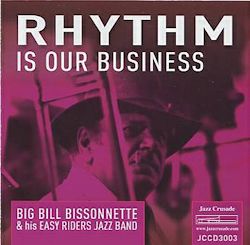
BUY NOW AmazonUK AmazonUS |
BIG BILL BISSONNETTE & HIS EASY RIDERS JAZZ BAND
Rhythm Is Our Business
|
1. Perdido St. Blues
2. Short Dress Gal
3. Sweet Mama
4. Shreveport Stomp
5. The Mooche
6. Bring it on Home to Grandma
7. Love Songs of the Nile
8. Apex Blues
9. Get Out of Here
10. Black Gal, You Better Watch Your Step
11. Big Chief Battle-Ax
12. The Bells of St. Mary’s
13. Rockin’ ‘N’ Rhythm
14. I’ll Take the South
15. Someday Sweetheart
16. Rhythm Is Our Business
17. Black Cat Moan
18. Running Wild
Big Bill Bissonnette – Trombone, vocals (tracks 10, 14, and 16)
Paul Bochmke – Reeds, vocals (tracks 6 and 16)
Bob Shallue – Piano (tracks 1 – 10)
Bill Sinclair – Piano (tracks 11 – 18)
Jim Tutunjian – String bass, vocals (tracks 2, 15, and 18)
Bob Lasprogato – Drums
Recorded Wallingford, Connecticut, on Sep. 2 (tracks 1-10) and Nov. 6 (tracks 11-18), 1986.
The late “Big” Bill Bissonnette strove for many years to help preserve New Orleans-style jazz, in the course of which endeavor he formed and led a band – the Easy Riders Jazz Band – as well as established a record label – Jazz Crusade – on which he recorded his own band along with others, some from New Orleans itself, who also played jazz in that style. He documented these efforts in his book THE JAZZ CRUSADE: The Inside Story of the Great New Orleans Jazz Revival of the 1960’s . Upbeat Records acquired the Jazz Crusade label before Bissonnette’s passing, and Upbeat’s Liz Biddle, who shares Bissonnette’s partiality for traditional jazz, is reissuing many of the label’s recordings to make them available again, this CD being one of them.
The first thing one will notice is that the tune list contains many songs that will probably not be that familiar to most jazz fans. Bissonnette deliberately sought out the seldom-recorded numbers, doubtlessly as part of his effort to create a band that was more than just another traditional jazz revivalist group playing the popular jazz repertoire as well as to keep these tunes extant. Their inclusion in the playlist here contributes much to the appeal of this CD, giving us as it does the opportunity to become familiar with—and enjoy—them. If you have been heretofore unacquainted with numbers such as Short Dress Gal, Black Cat Moan, et al., now is the chance to remedy that deficiency. I was unfamiliar with Sweet Mama and Black Gal, You Better Watch Your Step.
The emphasis is on collective improvisation, as it always is with the New Orleans style. This version of the Easy Riders jazz group follows that pattern but lacks a trumpet (or cornet) lead horn, having only a two-man front line of trombone and clarinet, as did several of the bands out of New Orleans on occasion, such as those of George Lewis and Sidney Bechet. The lead tends to be shared, alternatively, by the two front liners, Bissonnette and Bochmke, placing a greater burden on them than is usually the case. On reeds Bochmke demonstrates he is well up to the task, while on trombone Bissonnette manages to hold his own, although he is not up to the caliber of his idol, Big Jim Robinson. I did not care for his rather stiff staccato work on Perdido St. Blues, or the muted trombone capers on Black Gal, You Better Watch Your Step.
All told, however, the musical quality of the CD is quite high. The arrangements (“most of the ‘head arrangements’ are mine,” says Bissonnette) are interesting. Thus along with the shuffle rhythm, there are some unusual chords in Sam Morgan’s classic Short Dress Gal that I don’t recall having heard before. Ellington’s Sweet Mama, recorded frequently by different groups of his, has unusual clarinet obbligatos from Bochmke behind Bissonnette’s lead—bird-like runs with fast tonguing. Another Ellington composition, The Mooche, features nice muted trombone by Bissonnette and fine glissandi by Bochmke, the two executing some exquisite close harmony between them. Or again the arrangement of Love Songs of the Nile, perhaps the best thing to come out of the 1933 movie The Barbarian, nicely captures the wistful, almost plaintive quality of the song. The tune has been picked up by many traditional jazz bands and is still heard occasionally today even if the movie itself sank quietly into oblivion long ago.
Adding to the interest are some variations in group’s composition on some tracks. On Shreveport Stomp, taken at a breakneck tempo, trombone and drums are absent. Apex Blues has clarinet leading throughout, the rhythm backing being interesting stop time. Or the rest of the group having dropped out, the piano is left alone with Someday Sweetheart, delivering a solo which is redolent of Jelly Roll Morton with its phrasing and stop time.
Although the composition of this version of the Easy Riders Jazz Band is a departure from the usual, lacking a lead brass horn, it produces some very good jazz that cannot be absorbed fully at one listening. Accordingly, it will continue to find its way into my CD player in days to come.
Jazz Crusade CDs are available on the Upbeat web site www.upbeat.co.uk as well as from on-line sites such as Amazon.ere
Bert Thompson